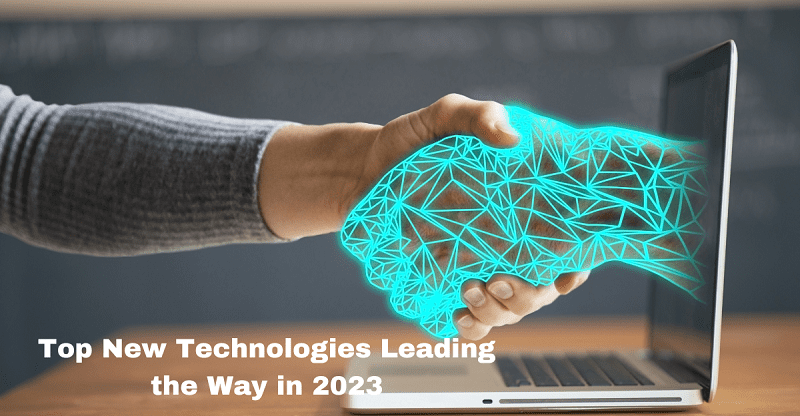
As technology continues to advance at a rapid pace, it’s hard to keep up with the latest innovations. Every year, we see new technologies that push the boundaries of what we thought was possible. In this article, I’ll be discussing the top new technologies that are set to revolutionize the future and lead the way in 2023.

Introduction to New Technology
Before we dive into the specific technologies, let’s first define what we mean by “new technology.” New technology refers to any advancements in the field of science and engineering that have been developed within the last few years. These technologies are often disruptive and have the potential to change the way we live and work.
New technology can encompass a wide range of areas, including artificial intelligence, robotics, biotechnology, nanotechnology, and more. The primary goal of new technology is to improve our lives, increase efficiency, and make tasks easier.
Top New Technologies Leading the Way in 2023
1. Artificial Intelligence (AI)
Artificial intelligence is at the forefront of new technology, and it’s not hard to see why. AI has the potential to revolutionize industries across the board, from healthcare to finance to transportation. AI algorithms are becoming more advanced and can now perform tasks that were once thought to be impossible for machines.
The field of medicine is experiencing a significant impact from AI, as it is being utilized in various applications. AI algorithms can analyze vast amounts of medical data and identify patterns that humans may not be able to see. Enhanced precision in diagnoses and improved treatment alternatives for patients can result from this.
2. Virtual Reality (VR) and Augmented Reality (AR)
Augmented and virtual reality are two technologies that are often grouped together, but they have different applications. AR involves overlaying digital information onto the real world, while VR is a fully immersive experience that transports the user to a virtual environment.
Both AR and VR have the potential to transform industries such as gaming, education, and retail. In the future, it’s likely that we’ll see more widespread adoption of these technologies as they become more affordable and accessible.
3. Internet of Things (IoT)
The Internet of Things refers to the network of devices that are connected to the internet, such as smart home devices, wearables, and industrial sensors. The IoT is growing at an exponential rate, and it’s estimated that there will be over 75 billion connected devices by 2025.
The IoT has the potential to improve efficiency and reduce costs in industries such as agriculture, manufacturing, and healthcare. By collecting data from a wide range of devices, companies can gain insights into their operations and make more informed decisions.
4. Blockchain Technology
The most popular application of blockchain technology is its use as the fundamental technology supporting cryptocurrencies like Bitcoin. However, its potential applications go far beyond finance. Blockchain is essentially a decentralized ledger that records transactions in a secure and transparent manner.
One area where blockchain is making a significant impact is supply chain management. By using blockchain, companies can track products from the point of origin to the point of sale, ensuring that they are genuine and haven’t been tampered with.
5. Node.js Development
Node.js is a programming language that allows developers to build server-side applications using JavaScript. It’s becoming increasingly popular due to its scalability and efficiency, and it’s likely that we’ll see more companies adopting Node.js development services in the future.
Node.js can be used to build a wide range of applications, from simple web apps to complex enterprise systems. It’s particularly well-suited for real-time applications, such as chat apps and online gaming platforms.
6. Quantum Computing
Quantum computing utilizes the principles of quantum mechanics to carry out computations and is considered a novel technological advancement. It’s still in the early stages of development, but it has the potential to revolutionize industries such as finance, cryptography, and drug discovery.
Quantum computing has a significant advantage over traditional computers in terms of its ability to perform calculations at a much higher speed. This could lead to breakthroughs in scientific research and the development of new materials and drugs.
7. 5G Technology
5G technology is the next generation of mobile networks and promises to be faster and more reliable than current 4G networks. It’s expected to have a significant impact on industries such as healthcare, transportation, and entertainment.
With 5G, it will be possible to stream high-quality video content on mobile devices and enable real-time communication between machines. This has the potential to bring about a whole new era of innovation and disruption.
8. Robotics
Robotics is a field involving the design, construction, and use of robots. They can be used in various industries, such as manufacturing, healthcare, and agriculture, to automate tasks and improve efficiency. Advances in robotics technology have led to the development of new types of robots, such as cobots and social robots. While concerns exist about job displacement, robotics technology can also create new job opportunities.
9. Nanotechnology
Nanotechnology involves the manipulation and engineering of materials at the nanoscale level. It is being applied in various industries, including electronics, medicine, and energy, to create new materials and devices with unique properties. However, there are concerns about potential health and safety risks associated with exposure to nanoparticles. Nonetheless, nanotechnology continues to hold promise for developing new solutions and is expected to be an important area of research in the future.
Conclusion and Future of New Technology
In conclusion, new technology is constantly evolving, and it’s impossible to predict exactly what the future holds. However, by keeping an eye on the latest developments, we can gain insights into the technologies that are likely to have the biggest impact in the coming years.
From AI to blockchain to 5G, the technologies discussed in this article are just a few examples of the many exciting innovations that are set to revolutionize the future. As these technologies become more widespread, we can expect to see significant changes in the way we live and work.
If you’re interested in staying up-to-date with the latest developments in new technology, be sure to follow industry news and attend conferences and events. By staying informed, you can position yourself to take advantage of the opportunities that arise as these technologies continue to evolve.
CTA: Want to stay up-to-date with the latest developments in new technology? Sign up for our newsletter today!
Author Profile
- I am the owner of the blog readree.com. My love for technology began at a young age, and I have been exploring every nook and cranny of it for the past eight years. In that time, I have learned an immense amount about the internet world, technology, Smartphones, Computers, Funny Tricks, and how to use the internet to solve common problems faced by people in their day-to-day lives. Through this blog, I aim to share all that I have learned with my readers so that they can benefit from it too. Connect with me : Sabinbaniya2002@gmail.com
Latest entries
 HealthFebruary 16, 2026Dentist Salary in India: Average Pay and Growth Opportunities
HealthFebruary 16, 2026Dentist Salary in India: Average Pay and Growth Opportunities BlogFebruary 16, 2026A Plain-English Look at How Modern Logistics Works
BlogFebruary 16, 2026A Plain-English Look at How Modern Logistics Works ArticleFebruary 9, 2026Lessons Learned from Managing More Than You Can Carry
ArticleFebruary 9, 2026Lessons Learned from Managing More Than You Can Carry ArticleJanuary 27, 20265 Practical Ideas for Office Swag That Boosts Moral
ArticleJanuary 27, 20265 Practical Ideas for Office Swag That Boosts Moral